Photo by Alexandre Cohen
Snowy Range, Wyoming

Photo by Joe Carducci

Falco Tinnunculus by James Fotopoulos
From the Desk of Joe Carducci…
Dave Kehr in the NYT on MoMA’s “Weimar Cinema, 1919–1933: Daydreams and Nightmares” (November 17, 2010–March 7, 2011) barely mentions Noir, thank God, but that’s the spreading Asian Carp of film history that is the context of his response to this series which sounds as if it complicates film history nicely though certainly futilely:
“In the standard film histories Weimar is synonymous with Expressionism, a movement that began in painting and theater and grew to include the exaggerated shadows, wildly stylized acting and doom-laden atmosphere of Robert Wiene’s Caligari, which burst upon an astonished world in 1920. But Expressionism was a short-lived novelty, taken up in a handful of films… before the public tired of its grotesque exaggerations. Instead the lessons learned from Expressionism — the dramatic use of dense patterns of light and shadow; the creation of complex, emotionally charged spaces through sets constructed in a studio — were tamed and absorbed into a wide range of genres…. [T]he revelation of the MoMA program is the large collection of comedies and musicals produced in the Weimar years. These are movies of wit, charm and lightness of touch that because they do not fit the traditional Weimar narrative of gathering fascist clouds, have largely been tossed out of the repertory.”
***
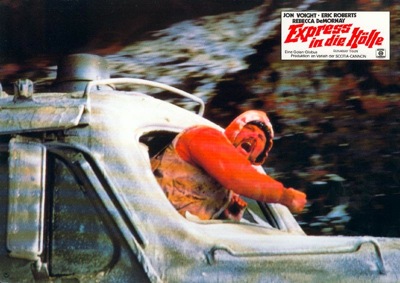 With Cannon Films’ bubbsey twins, Menahem Golan and Yoram Globus talking with the Lincoln Center Film Society’s Scott Foundas and Gavin Smith before or after the screening, it may be wiser to just rent Runaway Train (1985). Still, you might have an appetite for the big city hassle to see an important film in a nice theater. Jon Voight is not an actor I’m focused on in my forthcoming film book, but this film is dealt with in a chapter where I compare Soviet cinema’s sad-sack existentially cuckolded unhero with the American film hero, and also where I consider both cinemas departures from the classic forms: Epic, Tragedy, Comedy. In my summary of the now free Russia’s attempt to rebuild an autonomous heroic lead character I call Andrei Konchalovsky’s Runaway Train the first free Russian cinema masterpiece though it appears in exile five years before the fall of the U.S.S.R. [I consider Andrei Zvyagintsev’s The Return (2003) to be the first domestic free Russian masterpiece since before the revolution.]
With Cannon Films’ bubbsey twins, Menahem Golan and Yoram Globus talking with the Lincoln Center Film Society’s Scott Foundas and Gavin Smith before or after the screening, it may be wiser to just rent Runaway Train (1985). Still, you might have an appetite for the big city hassle to see an important film in a nice theater. Jon Voight is not an actor I’m focused on in my forthcoming film book, but this film is dealt with in a chapter where I compare Soviet cinema’s sad-sack existentially cuckolded unhero with the American film hero, and also where I consider both cinemas departures from the classic forms: Epic, Tragedy, Comedy. In my summary of the now free Russia’s attempt to rebuild an autonomous heroic lead character I call Andrei Konchalovsky’s Runaway Train the first free Russian cinema masterpiece though it appears in exile five years before the fall of the U.S.S.R. [I consider Andrei Zvyagintsev’s The Return (2003) to be the first domestic free Russian masterpiece since before the revolution.]Being a Cannon production, Runaway Train had the worst kind of poster art and so as I did inventory on Naperville’s Video Villa, beginning even then work on this book, watching a film or two a day for about ten months in 1986-7 while I found, bought and rehabbed my building in Chicago, Runaway Train was about the last film I rented. The video box art made it look like one of those incompetent international co-productions. It’s not. It’s one of the best action films and one of the best art films -- maybe the one true intersection of those categories.
Runaway Train
•Sat. Nov. 20, 7pm
The following Tuesday, sans Cannon extra features, is the second very Russian ex-pat film that Konchalovsky made in America in the last years of his supernation (Konchalovsky’s father wrote, and re-wrote a number of times, the Soviet national anthem’s lyrics; his brother, Nikita Mikhalkov, is some kind of special cultural apparat of Vladimir Putin, who is himself some kind of semi-free Russian hero but with cuckold tendencies.). In 1987’s Shy People, Konchalovsky, who took his mother’s maiden name to differentiate himself from Nikita -- also a filmmaker, found the thrall of a bayou Stalin in Louisiana.
Shy People
•Tues. Nov. 23, 1pm
***
Manohla Dargis makes of her NYT review of one of the stranger Criterion DVD collections, America Lost and Found: The BBS Story, a rare shot across the bow of olden New Hollywood, something well overdue. BBS were Bert Schneider, Bob Rafelson, and Steve Blauner, three pretentious underachievers par excellence given the size of the wave they caught or simply found themselves upon. The seven films are: Head (1968), Easy Rider (1969), Five Easy Pieces (1970), A Safe Place (1971), The Last Picture Show (1971), The King of Marvin Gardens (1972), and Drive, He Said (1972). Of these only Peter Bogdanovich and his The Last Picture Show had any real feel for Hollywood past. Dargis has less to say about most of the films than she does about the concatenations of generational aesthetic change in Hollywood and the greater failure of those that might have done better with all the studios left behind. One minor mistake in her recap of the origins of The Monkees is that the concept was not inspired by The Beatles but rather by Paul Revere and the Raiders; it did however take The Beatles first success in film, A Hard Day’s Night (1964), to award the rock band TV show idea the go-ahead -- rock and roll was of no interest and radio hits per se were no enticement to the producers of network television.
Dargis writes that New Hollywood “has been the subject of so much popular adulation and academic scrutiny as to become a veritable fetish. This was the era, or so its enthusiasts insist, when American movies grew up (or at least started undressing actresses); when directors did what they wanted (or at least were transformed into brands); when creativity ruled (or at least ran gloriously amok, albeit often on the studio’s dime).” Had there been less contempt, to use Godard’s word, the art-cinema New Hollywood had in mind might have improved genre filmmaking; Konchalovsky’s action-art masterpiece proved that still possible even five years after the extravagant but merely arty western-manqué Heaven’s Gate (1980) destroyed that New Hollywood already weakened by the Next Hollywood of Lucas, Spielberg, and on to what Dargis refers to as “the end of times known as Michael Bay.”
***
 David Mermelstein in the WSJ, "A Cultural Conversation with Kevin Brownlow".
David Mermelstein in the WSJ, "A Cultural Conversation with Kevin Brownlow".“Mr. Brownlow—then still an adolescent—began to seek out film's pioneers, many of whom were still alive in the 1950s. One of his first interviews was with Charles Rosher, who though little-known today had shared the first Oscar for cinematography, bestowed in 1929. ‘He had been one of the first in Hollywood to crank a handle, starting in 1911,’ recalled Mr. Brownlow. ‘He went on to become Mary Pickford's cameraman for about 12 years, and his cinematography made absolute nonsense of those who said silents were crude. He'd been a portrait photographer in Edwardian England.’
Soon thereafter, Mr. Brownlow started meeting important directors like King Vidor and Clarence Brown, and in 1964 he made the first of many trips to the U.S., recording the reminiscences of such early film superstars as Lillian Gish, Gloria Swanson and Louise Brooks.”
Jean-Luc Godard on his Oscar, translated at Landscapesuicide blog.
Now you are being modest. You and your colleagues developed the auteur theory that today structures the canon as works of directors.
The phrase la politique des auteurs was made up by journalists. When François Truffaut wrote his first articles, he only said: The auteur of a film is not the screenplay writer — it is not the one who gets the story on paper who is important, but the one who stages it.
In 1980, you revoked the auteur theory with a mea culpa. Why?
I suffered severely from the consequences, that they talked more about the author and not his works. That’s why I didn’t go to Cannes for the world premiere of my latest work Film socialisme: they would have only talked about me. But it was already like this during the Nouvelle Vague: we were no more than ten critics who spoke of films and not directors. By the way, this was a mistake: with Truffaut and Jacques Rivette, we only talked about cinema and not about ourselves. We didn’t know one another.”
***
NYT’s "Sentence of the Week", by art critic Roberta Smith:
“I refer to the uproariously erotic (if predominantly heterosexual) display of William N. Copley’s ‘X-Rated’ paintings from 1973-74 at the Paul Kasmin Gallery in Chelsea, and the take-no-prisoners, fluorescent-hued canvases of Peter Saul, seen in a brisk 50-year survey at Haunch of Venison in Midtown.”
***
Christopher Borrelli in the CT, "Sam Shepard offers more of himself."
“Shepard is 67; and he was born in Fort Sheridan. He wore jeans and a casual sports coat, the kind a rancher would wear in a movie, with suede at the shoulders. He seemed to be playing Sam Shepard and came across the way his work does, rooted but playful, part Dylan, part Clint, part Cormac McCarthy….
Indeed, how did he end up at this point, Shepard wondered, ‘playing yet another military man which I am not and never would be but my father most certainly was,’ portraying another stone-faced solider and authority figure showing ‘grim determination in the face of hopeless odds’? Where did that come from? He read from his story and wondered aloud about this – or was it that he wondered aloud about this while reading from his story? Either way, he said in that familiar crinkled rasp, if someone would ‘just tap me on the shoulder and invite me the hell out of here, believe me, I wouldn't miss it.’”
***
Tony Fitzpatrick interviewed in the CST.
“Ever hear of Chicago Alzheimer's? It's when you forget everything except the grudges.”
***
 Jimmy Alvarado in Razor Cake, gives us another amazing LA Punk story as he skillfully debriefs the surviving members of Nervous Gender, one of the unlikeliest bands and full of impossible people (Gerardo Velasquez, Michael Ochoa, Edward Stapleton, Phranc, and Sven their 8 year-old German drummer). Razor Cake, though it is the successor to Flipside put together by the staff when Al Flipside decided to stop, is a non-profit outfit and even a recipient of L.A. Dept. of Cultural Affairs grants! The piece may be posted eventually, but its long and only Part 1 so look for a copy. A lot of NG’s story was news to me though I have their records and saw them play. Here is part of their discussion on their origins, beginning with their connection to The Stains who did an album for SST (parentheticals are theirs):
Jimmy Alvarado in Razor Cake, gives us another amazing LA Punk story as he skillfully debriefs the surviving members of Nervous Gender, one of the unlikeliest bands and full of impossible people (Gerardo Velasquez, Michael Ochoa, Edward Stapleton, Phranc, and Sven their 8 year-old German drummer). Razor Cake, though it is the successor to Flipside put together by the staff when Al Flipside decided to stop, is a non-profit outfit and even a recipient of L.A. Dept. of Cultural Affairs grants! The piece may be posted eventually, but its long and only Part 1 so look for a copy. A lot of NG’s story was news to me though I have their records and saw them play. Here is part of their discussion on their origins, beginning with their connection to The Stains who did an album for SST (parentheticals are theirs):“Jimmy: Was The Snappers your first band?
Michael: …We would make cassettes and just kind of fuck around. And then Gerardo met up with Robert (Becerra) and Jesse (Amezquita, aka ‘Jesse Fixx,’ both members of The Stains), and he invited me over to meet them, and that’s how Snappers was formed.
Jimmy: That’s one of those bands that have kind of been lost. What can you tell me about that band?
Michael: I think we only did one show. I think we had only one rehearsal, or it was the second rehearsal, and the drummer quit. He hated what we were doing. Jesse moved to drums, Robert put a fuzz box on the bass, and Gerardo had an old synthesizer. Then he asked me to sing, so that’s how that formed. It was interesting stuff, but Jesse was so annoyed by what we were trying to do that he made sure that it self-destructed.
Jimmy: And that LACE show that you guys did, that was for Gronk, I believe, right? (Jimmy is referring to the 10/31/78 art exhibition opening at LACE for visual artists Gronk and Patssi Valdez, both members of East L.A. performance art group ASCO. This was The Snappers’ last show and the night Edward met Michael and Gerardo.) Were you guys aware of ASCO and some of the performance and avant-garde ASCO artists from East L.A.?
Joe: I think Non played that night, too.
Jimmy: Yeah, Monitor, too.
Michael: We met the Pasadena Art Mafia at that point, and connected with those guys really well. We liked those guys and started hanging out with them a lot.
Joe: They were all about the noise….
Michael: Well, all of us were just kind of alienated from where we were, and we were trying to get away from it. The last thing we wanted to do was hang out in East L.A….
Jimmy: Were you aware of, in trying to get out of East L.A., that there were these little pockets of stuff going on as well?
Michael: No, we weren’t aware of it. The thing about it was, me and Gerardo were both gay, and the last thing we wanted to do was hang out in East L.A., where being gay wasn’t the best thing.”
***
The Australian band, Gallucci, did a mixtape called “Paranoid Parade” which is a music-oriented collage somehow featuring Mike Watt reading a brief bit from my Enter Naomi book. It sounds along the lines of Negativland’s old KPFA sound-collages only not done live but done upside down on Australia’s ABC network.
***
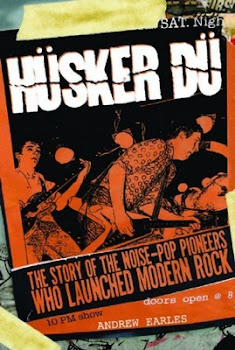 Rich Zweiback’s review in The Big Takeover of Andrew Earles' just issued book, Hüsker Dü: The Story of the Noise-Pop Pioneers Who Launched Modern Rock.
Rich Zweiback’s review in The Big Takeover of Andrew Earles' just issued book, Hüsker Dü: The Story of the Noise-Pop Pioneers Who Launched Modern Rock.“The author makes it clear in his forward that he would not be engaging in a ‘gossipy’ tone. Thus, many of the band dynamics that would have allowed for a more comprehensive perspective of the band are not included. The sexual dynamics between Hart and Mould, the death of road manager Peter Savoy and the dissolution of the band itself are not given the coverage that is needed. In a book such as this- those pressures and observations are crucial to understanding the band. While an extremely thorough analysis of the music is included (and is a strength of the book), more concentration on the lyrical messages inherent would have been helpful as well. The book also deals in depth with the first few years of Hüsker Dü fantastically; but does not delve into the ‘Candle Apple Grey’ and ‘Warehouse’ albums as well as it could have.”
***
"NPR Hires Outside Firm to Investigate Williams Firing, and Twitter facts" by Alicia Shepard.
“NPR held its fall quarterly board meeting on Nov. 11 and 12. On Thursday, there was a public comment session that allowed anyone inside or outside of NPR to comment on the firing of former news analyst, Juan Williams. But no one stepped up to the microphone.”
***
John Kay in the FT, "Even a filthy habit deserves a fair hearing."
“The studies I have cited are carefully referenced and use advanced statistical techniques. But sophistication of method is used to torture data to reveal conclusions that do not obviously follow from them, but which fit either the researchers’ preconceptions or the sponsor’s policy objectives, or both. Bad arguments do not necessarily invalidate the causes in which they are deployed. People should not drink and drive. Smoking is unpleasant and perhaps harmful to non-smokers. But these observation do not justify blurring the distinction between genuine scientific analysis and propaganda disguised as science.”
 David Kesmogel & Betsy McKay write in the WSJ that "Anti-Smoking Programs" are having their budgets cut around the country. They don’t say that any resultant rise in smoking levels will bring in more tax revenue, but that moral hazard was built-in to this uplift attempt and I’m surprised the WSJ lets it slide here. Any new universal health-care set-up will just exacerbate the level of state interest in personal behavior.
David Kesmogel & Betsy McKay write in the WSJ that "Anti-Smoking Programs" are having their budgets cut around the country. They don’t say that any resultant rise in smoking levels will bring in more tax revenue, but that moral hazard was built-in to this uplift attempt and I’m surprised the WSJ lets it slide here. Any new universal health-care set-up will just exacerbate the level of state interest in personal behavior.“States have cut their combined funding for smoking prevention in the current fiscal year to the lowest level since 1999, according to data gathered by a coalition of antismoking groups for a report that will be released later this month. The $517 million allocated by states for tobacco prevention and cessation in fiscal-year 2011 is down 9.2% from $569 million a year earlier and 28% less than states spent in 2008, according to the Campaign for Tobacco-Free Kids, a Washington advocacy group preparing the report, along with the American Lung Association and others.
The latest amount still exceeds the $300 million spent by states in fiscal 1999, when many programs were getting under way or accelerating their efforts following the landmark Tobacco Master Settlement Agreement in 1998 between 46 states and cigarette companies that was designed to help states recoup the cost of treating sick smokers. Under the agreement, the tobacco companies were to pay an estimated $246 billion over 25 years to the states, though states are allowed to spend their settlement dollars on needs other than tobacco prevention.”
***
Farai Mutsaka in the WSJ, "Zimbabwe Enemies Unite on Tobacco".
“For years, Zimbabwe's President Robert Mugabe and his allies have sought to drive white farmers from their land, and the farmers have fought back through the courts. In recent weeks, the World Health Organization has managed to bring the two warring camps together by attacking one of their few shared interests: tobacco.”
***
Binyamin Appelbaum in the NYT, "Putting Money on Lawsuits, Investors Share in the Payouts."
“Large banks, hedge funds and private investors hungry for new and lucrative opportunities are bankrolling other people’s lawsuits, pumping hundreds of millions of dollars into medical malpractice claims, divorce battles and class actions against corporations — all in the hope of sharing in the potential winnings….
A recent Nevada case illustrates one reason many companies are troubled by the rise of financing: They fear that investors will move from supporting to producing lawsuits.”
***
WSJ Editorial: "Wind Jammers at the White House".
“The eight-page October 25 memorandum to the President was written by soon-to-depart chief economic aide Larry Summers and senior policy aides Carol Browner and Ron Klain, and it's been kicking around Capitol Hill and industry circles for the last week. The trio walks through an interagency dispute about Energy Department subsidies for wind, solar and other forms of ‘renewable’ power, which DOE claimed were being held up by the joint Treasury and White House budget office (OMB) reviews.
Recall that the stimulus transformed the government into the world's largest private equity firm. The many tools now at DOE's disposal include $6 billion to guarantee loans and another dispensation so that the department can convert an energy investment tax credit equal to 30% of a project's cost into a direct cash grant to green developers.
The Summers memo notes that these two provisions alone reduce ‘the cost of a new wind farm by about 55% and solar technologies by about half relative to a no-subsidy case.’ So taxpayers are more than majority partners in these private projects, except they get no upside.”
***
George Gilder in the WSJ, "California’s Destructive Green Jobs Lobby."
“Conservative pundits have lavished mock pity on the state. But as America's chief fount of technology, California cannot go down the drain without dragging the rest of the country with it. The irony is that a century-long trend of advance in conventional ‘non-renewable’ energy—from wood to oil to natural gas and nuclear—has already wrought a roughly 60% drop in carbon emissions per watt. Thus the long-term California targets might well be achieved globally in the normal course of technological advance. The obvious next step is aggressive exploitation of the trillions of cubic feet of low-carbon natural gas discovered over the last two years, essentially ending the U.S. energy crisis.”
***
WSJ: "China’s ‘State Capitalism’ Sparks a Global Backlash."
“Western anger with China has focused on Beijing's cheap-currency policy; President Obama blasted the practice at the G-20 summit in Seoul last weekend…. China's national economic strategy is detailed and multifaceted, and it is challenging the U.S. and other powers on a number of fronts. China's economic approach today is still far more focused on government guidance than the world's other top economies. Central to China's approach are policies that champion state-owned firms and other so-called national champions, seek aggressively to obtain advanced technology, and manage its exchange rate to benefit exporters. It leverages state control of the financial system to channel low-cost capital to domestic industries—and to resource-rich foreign nations whose oil and minerals China needs to maintain rapid growth. China's policies are partly a product of its unique status: a developing country that is also a rising superpower.”
***
Andrew Kramer in the NYT, "Gazprom to Drill for Oil in Cuban Waters."
“Under the agreement, the Russian company will also assume a role in operating offshore drilling platforms. Russian oil firms, which operate mostly on land in Siberia, have little expertise offshore and have sought to form partnerships to gain experience….
As Cuba has made plans to drill for oil in the Gulf, concern has risen in Florida. Ocean scientists warn that a well blowout at a site where a Spanish company, Repsol, intends to drill next year could send oil spewing onto Cuban beaches and then the Florida Keys in as little as three days. Repsol has contracted with an Italian operator to build a rig made in China for the deep-water well about 50 miles from the coast of the United States. Cuba lacks the underwater robots and spare drilling rigs that would be needed to contain a big spill, while the trade embargo could complicate assistance by United States companies.”
***
Luke Johnson in the FT, "Graduates need to go beyond the City."
“A wise fellow recently have me his explanation for the financial crisis: too many highly intelligent graduates went to work in the investment banks on Wall Street and in the City…. Doing tedious things such as inventing real products, manufacturing goods and providing genuine services for a profit is hard work and takes time. It requires travel to savage places with industrial estates, many miles from the money centres full of skyscrapers. Whereas if you just manipulate vast sums of money -- via shares, bonds, options or even more complicated and obscure securities -- you just have to shave off a tiny fraction from each trade, and pretty soon you‘re raking in billions.”
***
Gerry Hassan at Opendemocracy.net, "Learning how to hug a Tory and the folklore of anti-Toryism."
“This isn’t a pro-Tory or anti-Tory argument. It is an argument against attaching labels to things, and the misuse of stereotypes which limit people’s thinking. Anti-Toryism feeds a sense of politics which has long outlived its usefulness, which belongs to a clichéd view of the past and periods such as the 1930s and 1980s, and which does not aid an open, creative, thoughtful politics.
In an age of uncertainty, change and fluidity, the time has surely come to finally abandon a set of attitudes which have no real relevance or usefulness in the present day.
Those of us who disagree politically with Conservative values, ideas and policies have to do better and aim higher. We have to learn how to debate, and relate to Toryism, to understand and even empathise with it. This will entail recognising that it is a valued and genuine part of the fabric of Scottish and British life.”
***
Max Hastings in the FT, "Britain’s old ruling class is on a high, but can it last?"
“All this prompts speculation, with varying degrees of enthusiasm, that Britain‘s upper crust is staging a comeback, that after decades in which it has become a cliché to assert that ‘we are all middle class now‘, toffs have climbed out of the tomb. Both Cameron and ‘Downton Abbey‘ profit from a popular revulsion against yobbishness.”
***
 James Grant in the NYT, "How to Make the Dollar Sound Again."
James Grant in the NYT, "How to Make the Dollar Sound Again."“The Federal Reserve was created in 1913 — by coincidence, the final full year of the original gold standard. At the outset, the Fed was a gold standard central bank. It could not have conjured money even if it had wanted to, as the value of the dollar was fixed under law as one 20.67th of an ounce of gold. Neither was the Fed concerned with managing the national economy. Fast forward 65 years or so, to the late 1970s, and the Fed would have been unrecognizable to the men who voted it into existence. It was now held responsible for ensuring full employment and stable prices alike.
Today, the Fed’s hundreds of Ph.D.’s conduct research at the frontiers of economic science. ‘The Two-Period Rational Inattention Model: Accelerations and Analyses’ is the title of one of the treatises the monetary scholars have recently produced. ‘Continuous Time Extraction of a Nonstationary Signal with Illustrations in Continuous Low-pass and Band-pass Filtering’ is another. You can’t blame the learned authors for preferring the life they lead to the careers they would have under a true-blue gold standard. Rather than writing monographs for each other, they would be standing behind a counter exchanging paper for gold and vice versa.”
***
Robert Skidelsky in the FT, "A golden opportunity for monetary reform."
“[T]he underlying cause of the present crisis was an increase in reserve ‘hoarding’, chiefly by China. This was made possible by the deliberate undervaluation of the renminbi against the dollar; its motive was to insure against another flight of ‘hot money’ from east Asia as happened in 1997-98. Under a gold standard, increased reserve accumulation would have been deflationary, since it would have drained the rest of the world of liquidity. Had Chinese reserves been held in gold rather than in US Treasury bills, the Fed would have been obliged to raise interest rates; as it was, it could run a cheap money policy.”
***
FT Analysis: "In gold they rush".
“Danny Gabay at Fathom, a London economic consultancy, notes that the inflation-gold price relationship broke down in the early 2000s just as international pressure ratcheted up on the Chinese to allow the renminbi to appreciate. He reckons that gold is in effect acting as a proxy for the Chinese currency. ‘Investors have become increasingly concerned about sovereign default and they think that most currencies should fall against the renminbi,’ he says. ‘But since non-convertibility means they can’t buy the renminbi, they buy gold instead, which can’t be debased.’”
***
Gillian Tett in the FT, "Dismal odds for an intellectual reformation".
“Twenty years ago, I used to feel a tad jealous of economists. Back then, I was doing doctorate research in the department of social anthropology at Cambridge university, which was a fascinating place to work but also underfunded, ignored by the outside world and riven with intellectual self-doubt. The economics department, by contrast, always seemed irritatingly cash-rich, prominent and confident. It had a good reason to strut: each year, streams of economics students would pour into jobs in governments and corporations, to positions of power, status and wealth. The economics department seemed the modern equivalent of a seminary: not only did it write the creed shaping western thinking, but it produced the priesthood too.”
***
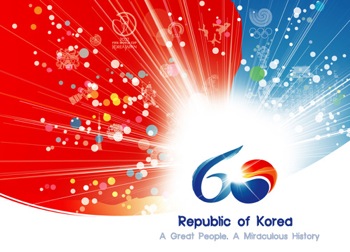 Nissa Rhee in the CSM, "G20 host Seoul positions itself as rags-to-riches mediator."
Nissa Rhee in the CSM, "G20 host Seoul positions itself as rags-to-riches mediator."“The country’s aggressive industrialization policies of the 1960s and '70s that emphasized exports helped create what Koreans call the ‘Miracle on the Han River.’ Between 1962 and 1989, the country experienced an average of 8 percent growth per year. Over the past 50 years, Korea’s GDP per capita has risen from around $100 to just under $20,000 today. The country’s rather recent emergence from economic destitution has put it in an unusual position among today’s advanced economies.
‘Korea can play an important role [at the G20 Summit] as a country that still has a living memory of poverty, but that is rich enough to know what economic prosperity means,’ University of Cambridge economics professor Ha-joon Chang told a Seoul audience last month. South Korea has used its rags-to-riches success to launch a series of campaigns encouraging poor countries to adopt what is known as the Korean development model.”
***
Evan Ramstad in the WSJ, "Meet in Korea Fuels G-20 Fever."
“Before world leaders assembled here to deliberate exchange-rate gyrations and the relative merits of stimulus versus austerity, South Koreans warmed up for the big event with academic conferences, a G-20 film festival and a G-20-theme pop concert of singers from across Asia. South Korea's first lady was a guest of honor at a G-20 formal style gala. As the G-20 enters its third year as the main forum for leaders to address global issues, South Korea is the first host not to have been a member of the more exclusive G-8. This point has led to an outpouring of national pride by citizens, corporations and top-level bureaucrats, whose office telephone systems have been greeting callers not with ringtones, but with bars from the G-20 song's chorus: ‘Let's gooooo! Oh oh oh!’ The fever had been building since nearly a year ago, when the flags of the G-20 countries appeared at airport baggage claims and in shopping malls across the country.”
***
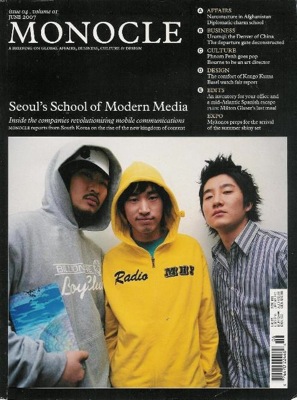 Jet-set correspondent and Monocle editor Tyler Brûlé writes in the FT about "Brand Korea", as if the Republic of Korea can actually be openly appraised east and west. But since the nation reached its democracy and its first world economy via an anti-communist military dictatorship it can be allowed to model for no other nation. Chile and Spain, and even Japan and Germany, bear similar burdens, even as one hears talk of the Chinese model. Only those do not have a still visible communist alternative staring at them across a DMZ to embarrass elite opinion.
Jet-set correspondent and Monocle editor Tyler Brûlé writes in the FT about "Brand Korea", as if the Republic of Korea can actually be openly appraised east and west. But since the nation reached its democracy and its first world economy via an anti-communist military dictatorship it can be allowed to model for no other nation. Chile and Spain, and even Japan and Germany, bear similar burdens, even as one hears talk of the Chinese model. Only those do not have a still visible communist alternative staring at them across a DMZ to embarrass elite opinion.Brûlé blithely offers, “It could be argued that a total brand statement for Korea will only come when the borders are thrown open and the country embarks on the long and painful road to reunification; in the meantime, South Korea needs to rein in other agencies and get the world to understand what it’s trying to say.” Perhaps he is semi-conscious of this weird force-field around ROK, but he doesn’t appreciate that China has been laying historical groundwork for its own claim to the north should the Democratic Peoples Republic of Chosin finally collapse; they never liked the idea of a Yalu River border. Or perhaps they’re just bucking for a price paid to them for a unified Korea. In any case there is so much invested in sealing off South Korea’s lessons from being applied to the half-paralleled, fully misremembered history of the lost RVN that there will always be a veil across ROK and its principle export will remain horror films.
***
MercoPress: Nicolas Eyzaguirre, "IMF Western Hemisphere Dept."
“Right now, the booming economies of emerging markets Brazil, India and China are like 'rockets' being fuelled by US and European investor inflows, Nicolas Eyzaguirre, the head of the IMF Western Hemisphere Department, told a business conference in Sao Paulo.
In return, slumping developed countries are trying 'to attach ropes to those rockets to drag themselves out' of their low-growth situations, he told the event, hosted by Britain's magazine The Economist. But 'China is avoiding being caught by the rope,' Mr Eyzaguirre said, pointing specifically to Beijing's policy of keeping its currency in line with the sliding US dollar.”
***
Jason DeParle in the NYT in his article "Defying Trend, Canada Lures More Immigrants", makes the same type of mistake Sam Donaldson made once when he came to believe in the literal truth of a mere political rap. Sam’s was about taxes and percentages, DeParle’s is about Immigration as his paper uses it. He writes the following as if it would such would never fly in America:
“In Canada, which has little illegal immigration, Manitoba won new power to bring foreigners in, handpicking ethnic and occupational groups judged most likely to stay. This experiment in designer immigration has made Winnipeg a hub of parka-clad diversity — a blue-collar town that gripes about the cold in Punjabi and Tagalog — and has defied the anti-immigrant backlash seen in much of the world.”
***
 Jan-Werner Müller interesting piece in the Boston Review, "Making Muslim Democracies", focuses on how Catholicism came to democracy. It’s mostly an interesting history of European Christian Democratic politics, which probably had one eye on American Catholics. Mller doesn’t really have his eye directly on whether the successful development of democratic reflexes in Catholics could model for what Europe needs from its Muslim population, but any consideration of that has to recall the centuries of rough stuff, the violence and ridicule heaped on the Church until it learned its place in post-Holy Roman Empire Europe. Perhaps the resultant new Europe’s more empathetic, welfare-oiled strategy will do the trick this time, but I doubt it.
Jan-Werner Müller interesting piece in the Boston Review, "Making Muslim Democracies", focuses on how Catholicism came to democracy. It’s mostly an interesting history of European Christian Democratic politics, which probably had one eye on American Catholics. Mller doesn’t really have his eye directly on whether the successful development of democratic reflexes in Catholics could model for what Europe needs from its Muslim population, but any consideration of that has to recall the centuries of rough stuff, the violence and ridicule heaped on the Church until it learned its place in post-Holy Roman Empire Europe. Perhaps the resultant new Europe’s more empathetic, welfare-oiled strategy will do the trick this time, but I doubt it.“Personalism was… simultaneously anti-liberal and anticommunist; its proponents held that liberalism and communism, for all their apparent differences, were forms of materialism, whereas personalism did justice to the spiritual dimension of human life…. In the 1930s personalism began to take off. For a time [Jacques] Maritain was a mentor to Emmanuel Mounier, editor of the premier personalist magazine, Esprit, which sought a communitarian alternative to liberal parliamentarianism. But Maritain worried that his disciple’s search for alternatives to liberal democracy would end in a form of authoritarianism, and, indeed, Mounier flirted with both the Vichy regime, and, after the war, Soviet Communism. Unlike many European Catholics, Maritain refused to endorse Franco or to portray the Spanish Civil War as a kind of modern crusade. He began to work out a philosophical rapprochement between Catholicism and modern conceptions of human rights and democracy, and in 1938 he published Integral Humanism, which advocated the place of Christianity in an increasingly ideologically diverse world. The book, with its clear endorsement of pluralism in the temporal sphere, became an early touchstone in Christian Democratic political theory.”
***
Liat Collins in the Jerusalem Post, "Double take and double think."
“Some of the stories grow bigger in the meantime; some fade only to return in a slightly different form later. Such is the strange case of UNESCO. I didn’t want to bash the world body two weeks running and since I was far from the only Israeli journalist to note the recent resolutions essentially redefining the Cave of the Patriarchs and Rachel’s Tomb as ‘Palestinian,’ I hesitated to write again about the organization using its mandate to rewrite history. Then I heard the planned venue of this month’s UNESCO-sponsored annual World Philosophy Day: Teheran. It was a column that could almost write itself.”
***
 Phyllis Chesler in Middle East Quarterly, "Ban the Burqa? The Argument in Favor."
Phyllis Chesler in Middle East Quarterly, "Ban the Burqa? The Argument in Favor."“The fact is that Muslim women are increasingly not given a free choice about wearing the veil, and those who resist are beaten, threatened with death, arrested, flogged, jailed, or murdered for honor by their own families, by vigilante groups, or by the state. Being fully covered does not save a Muslim woman from being harassed, stalked, raped, and battered in public places, or raped or beaten at home by her husband. Nor does it stop her husband from taking multiple wives and girlfriends, frequenting brothels, divorcing her against her will, and legally seizing custody of their children. A fully covered female child, as young as ten, may still be forced into an arranged marriage, perhaps to a man old enough to be her grandfather, and is not allowed to leave him, not even if he beats her every day. Moreover, after decades of attempted modernization in Muslim countries, the battle to impose the veil was launched again by resurgent Islamists…. As one Egyptian man lamented, ‘My grandmother would not recognize the streets of Cairo and Port Said. The women are covered from head to toe; the mosques blare hatred all day long.’ And this in a country where the authorities go to great lengths to fight Islamist influences.”
***
Pamela Ryckman in the NYT, "The Risk-Taking Edge of West Coast Women."
“‘Back east, my whole network was men,’ she said, ‘but here there’s this big group of incredible, fearless women. They rise a lot more quickly in their careers, and they support each other. They’ve made their own money and they take risks. There’s such a disconnect between the two coasts.’ …Ms. Perry Piscione sees West Coast businesswomen opening their Rolodexes and, perhaps more important, their wallets for one another, and she says she believes their East Coast counterparts have something to learn. ‘There are all of these women who made tons of money and now are not doing anything with it,’ she said. East Coast women may have attended top business schools and reached the apex of corporate America, but Ms. Perry Piscione said, ‘they’re not making their mark.’ They are losing relevance, she said, in the ‘new economy.’”
***
 George Packer in the NYTBR, on Timothy Garton Ash’s book, Facts Are Subversive.
George Packer in the NYTBR, on Timothy Garton Ash’s book, Facts Are Subversive.“Why doesn’t Garton Ash see in Hirsi Ali a figure of conscience like his friends from the Iron Curtain days? Because her scathing denunciations of what is cruel and unfree in Islam are not ‘showing the way forward for most Muslims in Europe, at least not for many years to come.’ This is true, but it isn’t the most important truth. Hirsi Ali isn’t a youth leader or social activist with a responsibility to show European Muslims ‘the way forward.’ She’s a dissident from the world of Islam who has been driven by personal suffering, and also by her treatment in liberal, multicultural Europe, to a radical rejection of any compromise between her former faith and the secular society she has embraced.
‘Writers are not diplomats,’ Garton Ash says in another essay. But he wants to live in a Europe where millions of believing Muslims feel welcome so that they don’t turn to jihad, and Hirsi Ali’s exacting standard makes it harder. This is a complicated matter, and Garton Ash is honestly working his way through it. That doesn’t make him a weak-kneed appeaser of Islamist ideology — there is plenty of evidence, in this essay and others, that Garton Ash has a keen sense of the threat and will not abandon his liberal convictions in the hope that it might disappear. But he doesn’t feel the oppressiveness of Islamic societies in his bones, as Hirsi Ali does, and as he felt it of Communism. He is, first and last, a European.”
***
Benjamin Wallace-Wells in New York, "Diplomat Gone Rogue."
“John Kenneth Galbraith was close to his sons until his death, in 2006, though he was intimidating too: witheringly logical and highly opinionated, six foot eight, with Rushmore features. But he gave his children something to defend. In Jamie’s case this was a critical theory of capitalism. In Peter’s, it was the beginning of a particular idea of how America might operate overseas—allying itself with the powerless, without seeking to remake their world.
In the immediate aftermath of the Iran-Iraq War, when the Reagan administration was strongly allied with Saddam Hussein, Galbraith (then a Senate staffer) flew into Kurdistan and emerged with documentation that the Iraqi troops were systematically rounding up and gassing their own people. In the Balkans, he directed the CIA to the mass graves at Srebrenica. As ambassador to Croatia, he gave tacit permission for the Iranians to ship arms through the country to arm the Bosnian Muslims and help turn back the Serb militias; this antagonized the CIA, which accused Galbraith of going rogue and persuaded Congress to hold hearings (Galbraith says he was acting under orders from the Clinton White House)…. In the run-up to the Iraq War in 2003, Galbraith supported the invasion and wrote op-eds reminding Americans of Saddam Hussein’s poison-gas campaigns to slaughter his own Kurdish citizens. But as Operation Iraqi Freedom began, Galbraith could see that the Bush administration’s plans for Iraq would not include a separate Kurdish state.”
***
James Poniewozik at Time.com, is predictable in his piece, "Olbermann Jousts Koppel in Battle of High Horses". The fundamental “known-forgotten” in all this unknightly mud-wrestling is that these clowns still agree that they want leadership from their politicians. Well, I give you George W. Bush. Some on the left pushed for such leadership out of Bill Clinton as regards Bosnia, and Rwanda, and a few of those felt the same when Saddam did not fall or behave after the first war. The rationale for the second Iraq War was clear enough to win authorization. If the now-conventionally wise anti-Bush anti-War Democrats were actually duped by forged evidence they would be leading a charge into Tehran right this minute. But they weren’t duped, they simply changed their minds when the rough going opened up a domestic political opportunity (this wasn’t true of those who opposed the war throughout such as Barack Obama and Pat Buchanan). Thinking back through the broadcast brotherhood’s phantasmagoria of self-congratulatory relief at discovering they’d been duped, what became clear is how few serious folks are about in our news media.
Perhaps its no business of ours what happens in Israel, Georgia, Poland, Rwanda, Nicaragua. I often think that when I hear what sounds like reflexive interest in odd corners of the world on the BBC expressed in an Imperial accent, or when I’m listening to Buchanan run down his take on the cost to our Republic of our Empire. But such words don’t always reflect reality clearly, especially those words inherited from the discourse of the true Imperial Age. Facts aren’t half as subversive as trade and trade survives and evolves, even under attempts at full suppression. The rules of trade might be critiqued, but probably not very convincingly by those who oppose it reflexively, as their best attempts to live a conscientious life are subverted by the motion of global trade through all human action. And ancient terminology with its settled meanings, do not apply to this moving target.
***
 Nicky Pear of COHA in the Santiago Times, "Bolivia’s new coast."
Nicky Pear of COHA in the Santiago Times, "Bolivia’s new coast."“From 1879 to 1884, Bolivia and Peru were embroiled in a military conflict with Chile over the control of territory on South America’s western shore. The War of the Pacific was fought both on land and at sea, and saw Chile conquer an area of Bolivia known as the litoral, or coast. Chile’s spoils of war included access to a greatly expanded and mineral-rich, former Bolivian territory. Bolivia, on the other hand, was left landlocked and has remained so to this day….
The story of Commander Eduardo Abaroa is today a thing of legend in Bolivia. During the military conflict with Chile, Abaroa cemented himself in Bolivian folklore by replying to an order to surrender: ‘¿Rendirme yo? ¡Qué se rinda su abuela, carajo!’ (‘Surrender? Your grandmother should surrender, you bastard!’) Abaroa’s legacy lives on in Bolivia, where the specter of the War of the Pacific looms large in the national conscience. The nationalistic desire to regain access to the Pacific Ocean is expressed every year on March 23, when Bolivians celebrate a national Day of the Sea (Día del Mar), during which they demand that Chile return part of Bolivia’s coastline.”
***
Uruguay’s president Jose Mujica at Mercopress.com.
“‘Any thing which you intend to accomplish is like a child birth’, said Mujica who took office last March as leader of the ruling left wing coalition Broad Front, a catch all party whose arch extends from radicals and communists to Christian democrats. He himself is the former leader of an urban guerrilla group from the sixties who spent almost 14 years in jail. Regarding the first general strike his administration had to face last month in spite of the fact that Uruguayan unions respond to the Broad Front coalition, Mujica said that it was basically union leaders who were doing most of the obstruction work.
However Mujica admitted Uruguay was on the right track ‘if we look at tax revenue figures, which is almost like in Scandinavian countries and certainly not like in Paraguay or Central America where people simply refuse to pay taxes’. But ‘in Norway and Sweden things work because the state, the bureaucracy is efficient, which does not happen in Uruguay, where it doesn’t work properly’. It’s a like a curse ‘Scandinavian taxes but Central American services’.”
***
At Opendemocracy.net, Mikhail Khodorkovsky final statement at 2nd trial.
“I am ashamed to see how people – people that in the past I respected – try to justify the arbitrariness of bureaucrats and lawlessness. They exchange their reputation for a quiet life within the framework of the current system, for privileges and sops. Fortunately, not everyone is like that, and there are increasingly more people of the other kind.
I am proud of the fact that among thousands of employees at YUKOS, after 7 years of persecution, none have agreed to give false testimony, to sell their soul and conscience. Dozens of people have been personally threatened, have been cut off from family and friends, and thrown in prison. Some have been tortured. But, even though they lost their health and years of their lives, they preserved what they considered most important, their human dignity.
Those who started this shameful case – [First Deputy Prosecutor General Yuri] Biryukov, [Investigator Salavat] Karimov and others - at that time contemptuously called us ‘traders’, regarding us as scum, ready to do anything to protect our prosperity and escape prison. Years have passed. And who turned out to be the scum? Who lied, torture and took hostages for the sake of money, and because they were afraid of the bosses?
And this is what they called a ‘matter of state’!”
***
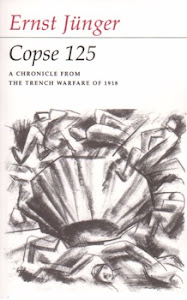 David Crossland in Der Spiegel, "Newly Published Memoir Recalls Horror of Western Front."
David Crossland in Der Spiegel, "Newly Published Memoir Recalls Horror of Western Front."“[Ernst] Jünger's war hero status and his books made him an idol of the German right in the 1920s and 30s. ‘The Nazis worshipped him but he didn't want anything to do with that rabble,’ said Krumeich, the historian. ‘He represented the idea that, happen what may to my body, I am indestructible, Germany is indestructible. That was a powerful argument among young people at the time.’
Some 10 million soldiers and civilians died, and 18 million were seriously wounded in the war, according to conservative estimates. A generation was decimated -- 35 percent of German men born in Jünger's birth year of 1895 were killed. But the war has faded from Germany's public memory in recent decades as the country was preoccupied with confronting the Nazi period and the Holocaust that followed it. The death in 2008 of the last German veteran known to have fought in World War I, Erich Kästner, went largely unnoticed.”

To receive a weekly update notice for the NV, send an email to newvulgate[at]sbcglobal.net with SUBSCRIBE in the subject line. To stop receiving notices, do the same with the word UNSUBSCRIBE.
• The New Vulgate
• Joe Carducci, Chris Collins, James Fotopoulos, Mike Vann Gray, David Lightbourne
• Copyright retained by the writer, artist, or photographer
No comments:
Post a Comment